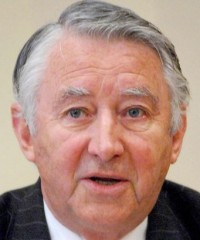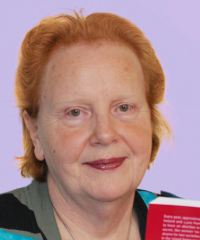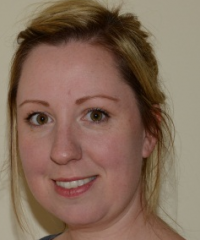
David Steel

David Steel nominated by Lisa Hallgarten
I would like to nominate David Steel to be a Champion of Choice because it was his private members bill that finally gave women in the UK access to safe, legal abortion. The 1967 Abortion Act is one of the most important pieces of legislation to address a public health issue. Before the 1967 Act up to 40 women a year died from illegal, unsafe abortion and countless more were injured at the hands of backstreet abortionists, or trying to self-abort. The generation of doctors and activists Steel worked with to draft this bill knew all too well the terror women lived with of getting pregnant, and the horrors of the backstreets. Nearly 50 years on we must keep those memories alive as we continue to campaign for free, safe, legal, accessible abortion.
Dawn Purvis

@dawnpurvis nominated by Anna Kenny
I would like to nominate Dawn Purvis as a champion of choice. Dawn has fought so hard for the women of Northern Ireland, and she has been through so much on our behalf. I think Dawn Purvis should be a champion of choice to show how grateful we are for all she has done. She has put our cowardly politicians to shame.
Patricia Lohr, bpas: Without pro-choice doctors, there is no choice for women.
Dr Patricia Lohr is the Medical Director at bpas and set up the successful Reproductive Health Externship.
Legalisation of abortion is a necessary pre-requisite to reductions in death and serious injury from unsafe abortion, but it is not sufficient to secure access to abortion for the many women who will need to terminate a pregnancy each year. For that, you need a willing and skilled clinician workforce, and according to the British abortion law, that means a ready supply of doctors.
Each of the nearly 200,000 abortions undertaken in England and Wales each year needs two doctors to sign the HSA1 form certifying that the request meets one of the legal grounds. Doctors are also the only type of clinician allowed to perform abortions, whether that means physically undertaking a surgical procedure or signing prescriptions for medical abortions that are then carried out by nurses or midwives. And, while only a relatively small number of women need to have an abortion in the second trimester or in a hospital setting, specialised training is needed to conduct these procedures safely particularly by surgical methods, which are lacking in hospital-based services.
Despite clear evidence that abortion saves lives and that control over when and whether to have children has tremendous personal, educational, and economic benefits for women and society, doctors are not signing up to undertake this work in large numbers and do not complete post-graduate training with the skills to provide comprehensive abortion care, especially at the latest gestations allowed by law.
The reasons for this are likely multifactorial but are influenced by lack of exposure to abortion care during training, few positive role models within training environments which junior doctors can aspire to emulate, the existence of abortion within the criminal code that can leave doctors feeling vulnerable, and few opportunities for career development within traditional employment settings.
These are complex problems, which will require a variety of solutions, but one successful programme to foster more positive attitudes to abortion and commitment to provision, are short externships for medical students in a variety of settings where abortion care is delivered. Developed in 1995 by the international, non-profit, grassroots organisation Medical Students for Choice (MSFC), these Reproductive Health Externships are now offered at 48 locations around the world including, for the past 3 years, at several BPAS clinics.
In their own study of 161 medical students who undertook externships in the United States, MSFC found that following participation students were significantly more knowledgeable about unintended pregnancy and able to counsel women about abortion, as well as significantly more supportive of abortion provision, and significantly more inclined to provide abortions in the future. Our experience has been equally positive and is best reflected in the comments provided to us from the students themselves:
“It was so eye opening to see the many different walks of life who availed of the service and comforting to see the great help they received for something, which I found from my experience, that every women found to be a challenging experience in their own way. I feel it will stand to me in the future when I am counselling my patients about their options. If it is still not legalised in my country (Ireland) when I am practising then I feel patients will appreciate the knowledge that I have had first hand experience of abortion services, that I have met many women who have gone through similar experiences to the ones they are facing and that I am there to help them no matter what their decision with no judgement but simply advice and support and to let them know that not everywhere is there a stigma or taboo attached to abortion.”
“Overall the experience was hugely positive. I have always considered a career around obstetrics and gynaecology and this placement has reinforced my interest in the area. At first I was unsure how I would feel/react to the placement but the professionalism of the staff and the realisation of the positive influence that the service BPAS offers on the women it serves was brilliant. I was worried that I would be put off a potential career in this service but I am now more likely to pursue a career in this area.”
“One of the most memorable high points of my clinical observations was when I was able to assist in an early gestation surgical abortion. This moment was a turning point for me in that it made me feel much more involved in this patient’s life. For those few minutes, I felt like I was doing my part to help this individual. She voluntarily visited this clinic looking to terminate her pregnancy, and I was able to help change her life.”
Finding new and innovative ways to engage and train doctors in abortion care is essential to fulfilling the promise of the Abortion Act in Britain. By bringing medical students into our clinics and giving them exposure to compassionate services delivered by competent and inspiring clinicians early in their careers, I feel BPAS is making a positive contribution that will benefit women for years to come.
Rebecca Schiller

@HackneyDoula nominated by @StudentmidwifeJ
Rebecca Schiller is my Champion of Choice who works tirelessly to advocate for women and their reproductive rights.
Speaking of I.M.E.L.D.A

@speakofIMELDA nominated by Ann Rossiter
Speaking of I.M.E.L.D.A. (Ireland Making England the Legal Destination for Abortion) is a London-based direct action feminist performance group challenging the severe anti-choice laws in Northern Ireland and the Republic of Ireland. Because of these draconian laws up to 4,000 women from the Republic and 1,000 from Northern Ireland travel each year to Britain or continental Europe to access safe, legal abortion, often in secrecy and always at considerable financial cost. Through its performances the group purposefully plays with the insidious and hypocritical culture of shame around abortion in Ireland, and with the rigid policing of women’s bodies.
Dr Katrina Erskine

Dr Katrina Erskine nominate by Danny Kelly
I nominate Dr Katrina Erskine of the Homerton hospital. Great doctor who supports women’s choice of how they deliver their babies.
Dilys Cossey, ALRA: Our abortion law is no longer fit for purpose. It’s time for decriminalisation.
Dilys Cossey was the Abortion Law Reform Association Secretary from 1964-68 and was a leading campaigner for abortion, birth control and reproductive rights through her further involvement with IPPF, FPA, Brook and IPAS.
Why call for decriminalisation of abortion? Surely abortion is legal? Yes, of course it is, but it is not generally realised that the 1967 Abortion Act per se only legalises abortion in certain circumstances as exceptions to the provisions of sections 58 and 59 of the 1861 Offences Against the Person Act (OAPA) which make abortion a criminal offence.
The 1967 Abortion Act was groundbreaking legislation. This 1960s reform, in which I was privileged to be involved as Secretary of the Abortion Law Reform Association (ALRA) campaigning team, reflected the social mores of that time and has served women and their families well. However, much has changed since then, not least the advent of medical abortion which has significantly transformed the abortion scene both for women and their healthcare providers.
Today the accumulated experience of nearly half a century points, among other things, to the need for clarification of the role of clinicians, for positive recognition of abortion services as an integral part of health care, for giving women autonomy in abortion choice, and for acknowledgement of contemporary social and sexual behaviour in Britain. The underlying nineteenth-century legislation is a block, exercising a ‘chilling effect’ with the threat of criminal proceedings for alleged infringements of the Abortion Act.
So, the question is: in today’s context is the Abortion Act fit for purpose? Certainly the 1861 Offences Against the Person Act is not. As the Law Commission stated in a recent scoping exercise, inviting views on whether selected sections of the OAPA should be reformed, ‘The Offences Against the Person Act 1861 is widely recognised as being outdated’. Unfortunately, the Law Commission is not intending to review the sections of this ‘outdated’ law that relate to abortion.
BPAS has already set the ball rolling in the decriminalisation debate at its meeting in the House of Commons, hosted by Kate Green MP on 16 October 2014, which included a contribution on the Canadian situation, where abortion has been decriminalised since 1988. I am pleased to support the call to regulate abortion in Britain according to the standards of the best clinical care, and invite all those who share these beliefs to join in the campaign for the decriminalisation of abortion.
Mara Clarke

@maraclarke nominated by @NybergAnja
Mara is Founder and Director of Abortion Support Network (ASN), an organisation that provides information, accommodation and financial assistance to women from Ireland & Northern Ireland who are forced to travel to England and pay privately for abortions. Mara is an inspiration – she goes to incredible lengths to support women who contact ASN for help, works tirelessly to grow and improve the organisation to help as many women as possible… and makes great cookies!
Ann Rossiter

Ann Rossiter nominated by @maraclarke
Ann Rossiter was one of a group of Irish women living in London who helped women travel for abortions from 1980 through 2000. The Irish Women’s Abortion Support Group (IWASG) helped many women access safe, legal abortions before the internet, mobile phones, and Ryan Air were in existence. Ann’s book “Ireland’s Hidden Diaspora: The making of a London-Irish Underground” introduced a new generation of activists to the history of feminist politics and activism, and continues to work with pro choice activism today. Ann is currently a member of Speaking of IMELDA (Ireland Making England the Legal Destination for Abortion), a performance group that – quite literally – brings drama to the abortion debate.
Caitlin Dean

@SpewingMummy nominated by Cheryl Scott-Smith
I would like to nominate Caitlin Dean for Pregnancy Sickness Support for all the work she does to try to help people who want to continue their pregnancies despite the extreme sickness to get the help and support and medication they need.
